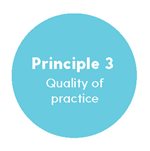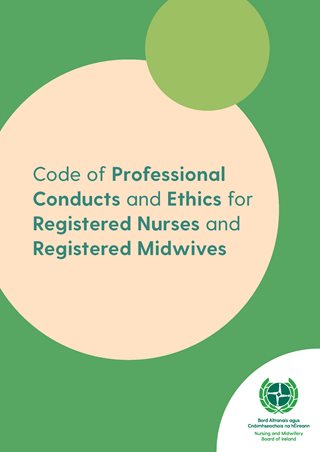Principle 3: quality of practice

This principle focuses on safety, competence, kindness, compassion, caring and protection from harm. Patients have a right to receive quality care by competent nurses and midwives who practise in a safe environment.
Values
- Nurses and midwives are competent, safety-conscious, act with kindness and compassion, and provide safe, high-quality care.
- Nurses and midwives make sure that the healthcare environment is safe for themselves, their patients and their colleagues.
- Nurses and midwives aim to give the highest quality of care to all people in their professional care.
- Nurses and midwives use evidence-based knowledge and apply best practice standards in their work.
- Nurses and midwives value research. Research is central to the nursing and midwifery professions. Research informs standards of care and ensures that both professions provide the highest quality and most cost-effective services to society.
Standards of conduct
- You must report any safety concerns you have about the healthcare environment and help to find solutions through appropriate lines of authority, such as your manager, employer or relevant regulatory body.
- You should deliver safe and competent practice based on best available evidence and best practice standards.
- You should actively participate in good clinical governance to ensure safe, quality care.
- You should be kind and compassionate in your practice.
- You must be competent to practise safely as a nurse or midwife. If there are limitations to your competency, you and your employer should address them so that you can practise safely and within your scope of practice.
- You must keep your knowledge and skills up-to-date by taking part in relevant continuing professional development. You must be prepared to demonstrate your competence if required.
- If you are involved in research, you should refer to our guidance on the ethical conduct of nursing and midwifery research and the ethical policies and procedures you are required to follow. You must ensure that the rights of patients are protected at all times in the research process.
Supporting guidance
Reporting safety concerns
You have a distinctive responsibility to uphold the quality and safety of the healthcare environment. This responsibility extends to reporting your concerns where you consider patient dignity is not respected. Nursing and midwifery managers have a responsibility to report and act on safety concerns that staff share with them. It may be necessary to escalate concerns if they are not dealt with by those in authority. This may involve staff or managers reporting to the next supervisory level.
Safe, quality practice is promoted by nurses and midwives actively participating in incident reporting, adverse event reviews and open disclosure, within a culture of candour.
You should refer to national legislation and employer policy for information on the legal responsibilities of the employee and the employer regarding health and safety concerns. The Protected Disclosures Act 2014; Safety, Health and Welfare at Work Act 2005; Protection of Disclosures of Information (Part 14 of the Health Act 2007); and the Civil Liability (Amendment) Act 2017 are key sources.
The Civil Liability (Amendment) Act 2017 details the procedure for preparing and making an open disclosure, which includes a written statement to the patient at an open disclosure meeting, containing information in relation to the incident, and includes an apology, if appropriate. The information provided in making an open disclosure or an apology:
- does not constitute an admission of fault or liability or clinical negligence;
- will not be admissible as evidence of fault or liability in court;
- it will not invalidate the indemnity of the health service provider
- and it shall not constitute an express or implied admission of fault, professional misconduct, poor professional performance or unfitness to practice in any complaint subsequently made to a regulatory body.
General information about protected disclosures and whistleblowing is available at www.gov.ie.
National standards from other regulators, for example Health Information and Quality Authority and the MHC, give information about safe standards of care. An international source is the World Health Organisation Patient Safety initiative.

Code of Professional Conduct and Ethics for Registered Nurses and Registered Midwives
.pdf Download (279KB)
Download